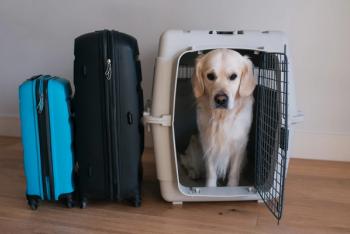
Putting a bigger bite in dog law
Harrisburg, Pa. - Sweeping legislation is aimed at cleaning up Pennsylvania puppy mills, but the Pennsylvania Veterinary Medical Association says the proposals still need some work.
Harrisburg, Pa. — Sweeping legislation is aimed at cleaning up Pennsylvania puppy mills, but the Pennsylvania Veterinary Medical Association says the proposals still need some work.
Hearings were held last month on the bills, which are endorsed by Gov. Ed Rendell, after nearly two years of back-and-forth wrangling between animal-welfare groups and breeders.
In April, "The Oprah Show" did a special on puppy mills in Lancaster, Pa.— estimated to have the nation's highest concentration of commercial breeders — at the urging of Bill Smith, founder of Main Line Animal Rescue in Chester Springs, Pa. The show couldn't have come at a better time, Smith says.
The legislation mandates veterinary exams at least once a year, or once a pregnancy, and would establish a veterinary-care program. Other provisions deal with euthanasia, rabies vaccinations, cage size, exercise and other issues.
At the June 12 hearings, Dr. Robert Lavan, chairman of the PVMA's Legislative & Regulatory Affairs Committee, testified that the PVMA supports many of the provisions, but that the language should be reviewed.
"Sometimes the best intentions have unintended consequences," Lavan says. "While everyone is not in agreement about whether commercial breeding kennels should be eliminated and some argue that the intent of the administration is to do just that, we feel that positive changes related to improving life for the dogs, development of programs and cooperative initiatives with the breeders and better enforcement of the laws are the most effective and best ways to ensure the welfare of the dogs, which we all as stakeholders seek to advance. By creating an environment that is prohibitive and punitive, even excellent commercial kennels will close and the problem kennels will simply go underground or out of state. This will not improve the situation for these dogs; it will worsen it."
In May, three bills were introduced in the Pennsylvania House of Representatives to strengthen current anti-cruelty laws and improve conditions in commercial breeding kennels.
House Bill 2525 doubles the minimum floor space for dogs and requires solid flooring, as well as access to an outdoor exercise area twice the size of the primary enclosure. It also would mandate annual veterinary care and eliminate the stacking of cages for adult dogs.
An estimated 650 commercial breeders, classified as those who sell more than 60 dogs a year, operate in Pennsylvania, and there are 2,750 licenses for those who house or transfer 26 or more dogs each year.
For the most part, PVMA supports the proposed changes to HB 2525, but suggests some adjustments.
PVMA did take exception with the proposed cage requirements. Lavan testified that solid flooring is unsanitary. He said the type of caging shown in the American Society for the Prevention of Cruelty to Animals (ASPCA) photos is "an extreme" example of enclosures used by breeders.
He suggested kennels use an alternative material that would not harm paws but still allow waste to pass through.
Other bills introduced in May include House Bill 2532, which deals specifically with debarking. Under the proposed law, only a veterinarian could debark a dog or perform a Cesarean. Tail docking would be allowed by owners until a dog is 3 days old, after which it would have to be done by a veterinarian. A hearing on HB 2532 was postponed.
House Bill 499 calls for higher fines for cruelty to animals, and requires owners of dogs seized for cruelty to pay reasonable expenses for their care at a shelter or else surrender ownership. That measure remains in committee.
The PVMA wants some changes in the proposal, such as not mandating that dogs' exercise be exclusively outdoors, because of weather variations.
And it wants to broaden the rabies-vaccination provision to allow both DVMs and those under their supervision to administer vaccinations.
The organization also calls for training for dog wardens inspecting bitches and their puppies.
Dr. Bryan Langlois, vice president and medical director of the Humane League of Lancaster County, testified at the hearings.
"I have seen some of these kennel environments in Lancaster County firsthand during inspections and warrant executions," he said.
"I have also been responsible for the after-care of those animals taken and/or signed over to the Humane League at the request of the kennel owner or a court. It is with this background that I am happy to support a majority of the initiatives and regulations proposed in the bill."
Langlois disagreed with the PVMA over flooring, which he said should be solid, but favored other provisions of HB 2525. He said he felt it should go further, in terms of doubling the space requirements for all dogs, and reducing the number allowed per enclosure.
While details continue to be worked out in the Legislature, the dog law likely won't have any significant changes until at least September.
For more information on the proposed legislation, visit
PVMA stance on HB 2525:
CAGE SIZE: PVMA supports the increased cage size, and does not oppose the inclusion of two dogs in a cage because of the companionship and social benefits to the dogs.
SOLID FLOORING: PVMA opposes solid flooring for primary enclosures as unsanitary, and recommends the floor be strong enough that it doesn't sag or bend and be constructed of a heavier grid of material that allows for drainage of waste, and with slots small enough that dogs' feet cannot become entrapped.
EXERCISE: PVMA supports required exercise for dogs outside their primary enclosures, but does not believe it always must be outdoors. It says all exercise plans should be based on the recommendations of a veterinarian.
RABIES VACCINATIONS: PVMA supports rabies vaccinations by veterinarians, but recommends that the law be broadened to allow vaccinations administered under the supervision of a veterinarian as well.
EXAMINATIONS BY DVMS: PVMA supports the provision calling for yearly examinations by a veterinarian or at each pregnancy.
EUTHANASIA: PVMA supports this provision, but recommends an exemption to allow a veterinarian to euthanize in an emergency, without prior notification to the department, if in his or her opinion the dog is suffering.
PROGRAM OF VETERINARY CARE: PVMA supports an established program of veterinary care.
TEMPERATURE AND VENTILATION: PVMA supports the recommended temperature range for kennels, but would like language to be added to allow for the recommendations of attending veterinarians and for breed and population density variances.
DOG WARDEN INSPECTIONS AND TRAINING: PVMA recommends that training of wardens be required on the special needs of bitches with their puppies in whelping areas.
Newsletter
From exam room tips to practice management insights, get trusted veterinary news delivered straight to your inbox—subscribe to dvm360.




